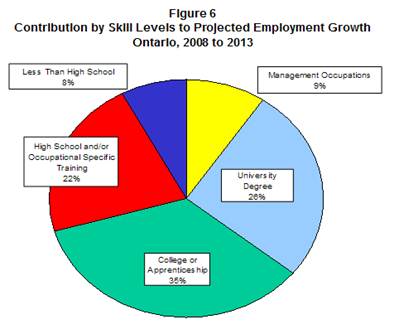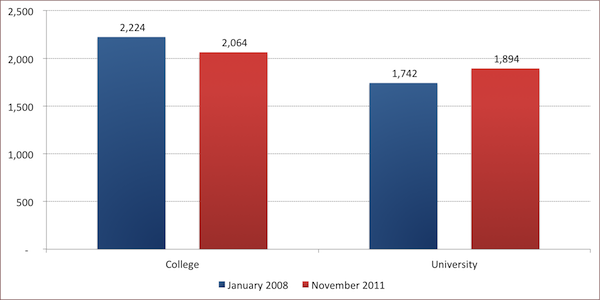Many of you will have seen a Toronto Star story last week about a new report from the Ontario government indicating that in the wake of the recession, the provincial economy was creating more new jobs for college grads and apprentices than for university graduates. Cue blather about how technology and the recession are radically changing the labour market, etc.
Did anyone else find it odd that the Star never named the study? I still haven’t been able to locate an actual document, just a TCU webpage with the following pie chart presented without back-up documentation:
It looks like one of those “job projections” that HRSD puts out through its Occupation Projection System. Except that the latest COPS projections show something very different: their latest report, which covers the period 2008-2017, suggests that new jobs that normally require university will grow 66% faster than jobs which normally require college.
Another oddity was the use of the word “projection” to look at a period (2008-13) which is two-thirds over. Forget projections – why not just check how employment has actually evolved for those two groups? Well, I did, and it turns out that total employment among college graduates actually dropped 7.2% since January 2008, while rising by about 8.5% for university graduates.
Employment, Ontario, by Highest Education Level, in Thousands
What’s going on here? I think TCU simply mislabeled its graphs. Their figures represent “total job openings,” not “employment growth.” “Total job openings” are composed of “replacement jobs” and “new jobs.” The “replacement jobs” data massively favour college grads, because that’s the skill level already required of most jobs in Canada. The “new jobs” data looks better for university-educated students. But since 75% of all job openings are replacement jobs, figures for “total job openings” figures ends looking best college grads. (Page 57 of the COPS report shows exactly this; the proportions line up very closely with the Ontario graph.)
In other words, college graduates will in future fill a greater number of positions than university graduates because they already have more jobs in absolute (but not relative) terms, not because the economy is tilting in their direction.
There’s probably some other stuff going on here – the population with college degrees is a bit older and retiring faster; using “highest degree of education” obscures what’s going on with university graduates who later attend college, etc. And there’s the fact that the Star writer completely left out the “management” category of jobs – which is overwhelmingly populated by university graduates – when writing her story.
But forget about there being a sea change in the labour market. This just looks like a case of bad graph labeling and weak reporting.



 Tweet this post
Tweet this post

Well the TCU posting is dated 8/12/09 10:15:00 AM which I read as 2009, not sure why the heck it would show up in the media now. But doesn’t surprise me that university grad positions are in smaller number, they are typically mgmt and higher level.
Heh. Didn’t notice a time-stamp. Good spot.
I have yet to hear from anyone who can locate this study. I have spoken to a couple who have asked the Ministry, but apparently no answer is forthcoming.